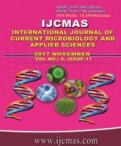


 National Academy of Agricultural Sciences (NAAS)
National Academy of Agricultural Sciences (NAAS)

|
PRINT ISSN : 2319-7692
Online ISSN : 2319-7706 Issues : 12 per year Publisher : Excellent Publishers Email : editorijcmas@gmail.com / submit@ijcmas.com Editor-in-chief: Dr.M.Prakash Index Copernicus ICV 2018: 95.39 NAAS RATING 2020: 5.38 |
The temperature downshift results in (1) decrease in membrane fluidity (2) changes in nucleic acid structures (3) reduced ribosome function (4) inefficient protein folding. Bacteria respond to this low temperature change by producing cold-shock proteins (CSPs) that bind to single-stranded RNA and DNA thereby, maintaining cell physiology. CSPs have been widely studied in Escherichia coli and Bacillus subtilis. Here we discuss the cold adaptation by desaturase system, RNA chaperone, and transcription antitermination function of CspA homologues.
 |
 |
 |
 |
 |